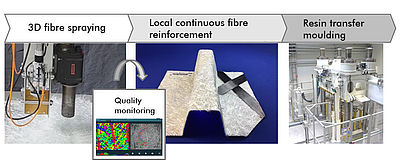"iComposite 4.0", is a project which promises an enormous productivity increase in the production of fibre-reinforced plastic parts and a cost saving of up to 50 percent. The keys to the success are the paradigm change from tolerance-controlled production to a production that is oriented to self-regulation of the product function, as well as the combination of part manufacture without rejects or off-cuts.
As part of the research project iComposite 4.0 funded by the German Federal Ministry for Education and Research (BMBF), two Aachen-based research teams from the Institute of Plastics Processing (IKV) in Industry and the Skilled Crafts at RWTH Aachen University and from the Aachen Centre for Integrative Lightweight Design (AZL) are working together on the economical large-series production of FRP parts. Fibre-reinforced plastics (FRP) are, because of their very good weight-specific mechanical properties, of great interest for use in lightweight construction applications in the automotive industry and in aviation. Until now, however, component production has been characterised by complex and cost-intensive production processes with a low level of automation, inefficient material deployment due to offcut wastage and high reject rates, and thus high costs per part. This, in turn, means good potential for productivity increases that can, in the sense of Industry 4.0, be achieved with the digitisation of production and the linking up of production machines. That is precisely the aim of iComposite 4.0. The project pursues the approach of building up an intelligent, self-regulating production system for the economical large-volume production of FRP parts.
The basis for this resource-efficient production system is the 3D fibre spraying process developed at IKV. With this process, fibre rovings are cut automatically and with high volume throughput to a desired fibre length and, in an oriented state, applied to a complex lay-up mould. The process makes it possible to efficiently produce, without wasting expensive semi-finished fibre materials and without complex draping processes, a preform with near net-shape contours and taking into account the load paths of the component. Nevertheless, process-related fluctuations in the fibre orientation can occur during the preforming process as well as fluctuations in the fibre weight per unit area that cause deviations in the mechanical properties of the part. So that the 3D fibre spraying process can be effectively used for series production despite these fluctuations, it is, as part of iComposite 4.0, integrated into a self-regulated production system. Through inline monitoring of the fluctuations with regard to fibre orientation and fibre distribution in each preform, these fluctuations can be balanced out with inserts of continuous fibre so that, despite individual properties of the semi-finished products, a quality-assured part with constant mechanical properties is produced after impregnation, tailored to the respective preform, in the resin transfer moulding process.
Contact:
Nadine Magura, M.Sc.
phone: +49 241 80-28330
nadine.magura@ikv.rwth-aachen.de

